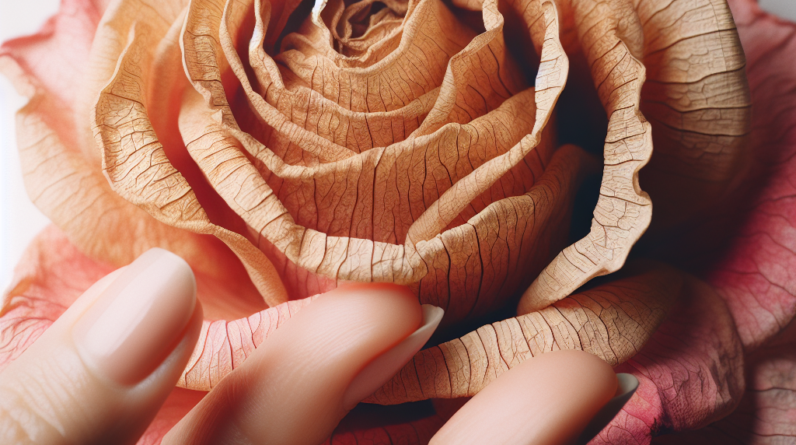
Are you looking for ways to maintain beautiful and radiant skin as you age? Look no further! In this article, we will explore the fascinating world of skin aging and provide you with valuable insights into anti-aging skincare. Discover the secrets behind using high-quality products and implementing effective skincare routines to keep your skin looking youthful and healthy. Join us on this skin aging study as we delve into the realm of healthy anti-aging procedures. Get ready to unlock the key to maintaining your youthful glow!

Factors Contributing to Skin Aging
Sun Exposure
One of the primary factors contributing to skin aging is prolonged sun exposure. The sun’s harmful ultraviolet (UV) rays can penetrate the skin and cause a multitude of problems. Over time, excessive sun exposure can lead to the breakdown of collagen and elastin, which are essential proteins responsible for maintaining the skin’s firmness and elasticity. Furthermore, UV rays can also trigger the production of free radicals, causing oxidative stress and damage to the skin cells. Protecting your skin from the sun by wearing sunscreen, protective clothing, and seeking shade can significantly minimize the aging effects caused by sun exposure.
Smoking
Smoking is not only detrimental to your overall health but also greatly affects the condition and appearance of your skin. The chemicals found in cigarettes can constrict the blood vessels, impair blood circulation, and deprive the skin of necessary nutrients and oxygen. This can result in the formation of wrinkles, fine lines, and a dull complexion. Moreover, smoking can also decrease collagen production and lead to a loss of elasticity in the skin. By quitting smoking, you can slow down the skin aging process and improve your overall health.
Poor Nutrition and Hydration
Proper nutrition and hydration play a crucial role in maintaining healthy and youthful skin. Eating a well-balanced diet rich in fruits, vegetables, whole grains, and lean proteins provides essential vitamins, minerals, and antioxidants that promote skin health. Conversely, a poor diet lacking in nutrients can accelerate the aging process and contribute to the development of wrinkles, dryness, and uneven skin tone. Additionally, it is crucial to stay adequately hydrated by drinking plenty of water throughout the day. Proper hydration helps to keep the skin moisturized, plump, and supple.
Stress
Chronic stress can wreak havoc on your skin and accelerate the aging process. When you are under stress, your body releases stress hormones such as cortisol, which can lead to increased inflammation and collagen breakdown in the skin. This can result in the formation of fine lines, wrinkles, and dullness. Additionally, stress can also disrupt your sleep patterns, further contributing to skin aging. Finding effective stress management techniques such as exercise, meditation, or engaging in hobbies can help reduce the impact of stress on your skin and overall well-being.
Sleep Deprivation
Adequate sleep is essential for maintaining healthy skin. During sleep, your body goes into repair mode, producing collagen and repairing any damage caused during the day. When you consistently deprive yourself of sleep, your skin does not have enough time to undergo this vital rejuvenation process. As a result, the signs of aging, including fine lines, wrinkles, and a lackluster complexion, become more prominent. Ensuring you get enough quality sleep each night, ideally between 7-9 hours, can significantly contribute to the youthful appearance of your skin.
Effects of Skin Aging
Wrinkles and Fine Lines
One of the most noticeable effects of skin aging is the development of wrinkles and fine lines. These are caused by the natural breakdown of collagen and elastin fibers in the skin, as well as external factors like sun exposure, smoking, and repetitive facial expressions. As we age, the production of collagen and elastin decreases, resulting in the loss of skin elasticity and the formation of wrinkles. Targeted skincare treatments and preventive measures can help reduce the appearance of wrinkles, maintaining a more youthful complexion.
Age Spots
Age spots, also known as liver spots or sunspots, are flat areas of discolored skin that often appear on areas exposed to the sun, such as the face, hands, and arms. They are caused by an overproduction of melanin, the pigment responsible for the color of our skin. As we age, the production of melanin becomes less regulated, leading to the uneven distribution of pigmentation. Age spots can give the skin an aged and blotchy appearance, but they can be minimized or prevented through the use of sun protection and targeted skincare treatments.
Loss of Elasticity
As we age, our skin gradually loses its elasticity, becoming saggy and less firm. This is primarily due to the decline in collagen and elastin production, as well as the loss of fat beneath the skin’s surface. Without adequate support, the skin becomes more prone to gravity’s effects, resulting in drooping and sagging. Targeted skincare products containing ingredients like retinol and peptides can help improve skin elasticity and firmness, providing a more youthful and lifted appearance.
Dullness and Uneven Tone
Another common effect of skin aging is dullness and uneven skin tone. As the skin ages, cell turnover slows down, causing a build-up of dead skin cells on the surface. This can lead to a lackluster complexion and a more pronounced appearance of fine lines and wrinkles. Additionally, factors like sun damage and hormonal changes can contribute to an uneven skin tone, with areas of hyperpigmentation or discoloration. Exfoliation, brightening skincare products, and professional treatments like chemical peels can help address dullness and restore a more even skin tone.
Understanding Skin Aging Process
Intrinsic Aging
Intrinsic aging, also known as natural or chronological aging, refers to the internal factors that contribute to the aging process. These factors are largely determined by your genetics and the natural physiological changes that occur as you age. The effects of intrinsic aging are inevitable and cannot be prevented entirely, but understanding them can help you take appropriate measures to slow down the process.
Extrinsic Aging
Extrinsic aging, on the other hand, is primarily influenced by external factors that you have more control over. These factors can accelerate the skin aging process and are often a result of environmental exposure and lifestyle choices. By addressing these external factors, you can minimize the visible signs of aging and maintain a more youthful appearance for longer.
Intrinsic Aging: Internal Factors
Genetic Factors
Your genetic makeup plays a significant role in how your skin ages. Some individuals may be genetically predisposed to produce more collagen and have better skin elasticity, resulting in fewer visible signs of aging. Conversely, others may have a genetic tendency to produce less collagen or have a weaker antioxidant defense system, making them more prone to premature aging. While you cannot change your genes, understanding your genetic predisposition can help you make more informed choices when it comes to skincare and lifestyle habits.
Hormonal Changes
Hormonal changes, particularly during menopause, can have a significant impact on the aging process. As women enter menopause, the production of estrogen decreases, leading to a decline in collagen and skin thickness. This hormonal shift can result in the loss of elasticity, dryness, and increased susceptibility to wrinkles. Hormone replacement therapy (HRT) and skincare products containing ingredients like retinol can help address these effects and promote more youthful-looking skin.
Natural Moisture Loss
With age, the skin’s ability to retain moisture diminishes. This occurs as a result of a decrease in natural skin oils and the weakening of the skin’s barrier function. As moisture evaporates from the skin more quickly, it can become dry, rough, and prone to fine lines and wrinkles. Using moisturizers and hydrating skincare products can help replenish and lock in moisture, preventing excessive dryness and maintaining a smoother and plumper complexion.

Extrinsic Aging: External Factors
Ultraviolet (UV) Radiation
Excessive exposure to UV radiation from the sun or tanning beds is one of the most significant external factors contributing to skin aging. UV rays damage collagen and elastin fibers, leading to the breakdown of these essential proteins and a loss of skin firmness and elasticity. They also trigger the production of free radicals, which can cause DNA damage, collagen degradation, and oxidative stress. Protecting your skin from UV radiation through the consistent use of sunscreen and seeking shade can help prevent the harmful effects of sun exposure.
Pollution
Pollution, including air pollutants and toxins, can have a detrimental effect on the skin, accelerating the aging process. These pollutants can penetrate the skin and generate free radicals, contributing to oxidative stress, inflammation, and collagen degradation. Long-term exposure to pollution can lead to a dull complexion, uneven skin tone, and premature development of wrinkles. Regular cleansing and the use of antioxidant-rich skincare products can help combat the damaging effects of pollution on the skin.
Free Radicals
Free radicals are unstable molecules that are naturally produced in the body. However, external factors such as UV radiation, pollution, and smoking can increase the production of free radicals, leading to oxidative stress and damage to the skin cells. This oxidative stress can accelerate the breakdown of collagen and elastin, resulting in wrinkles, sagging, and other visible signs of aging. Antioxidants, both topically applied and consumed through diet, can help neutralize free radicals and protect the skin from their damaging effects.
Sleep and Lifestyle Habits
Lifestyle habits, including sleep patterns and stress levels, can significantly impact the aging process of the skin. Sleep deprivation can disrupt the natural repair processes that occur during sleep, leading to increased signs of aging such as dullness, fine lines, and decreased skin elasticity. Additionally, chronic stress can contribute to increased inflammation and the production of stress hormones, further accelerating the aging process. Prioritizing adequate sleep and adopting stress management techniques can help minimize the effects of these lifestyle factors on your skin.
Role of Collagen and Elastin in Aging
Importance of Collagen and Elastin
Collagen and elastin are vital proteins that provide structure, elasticity, and support to the skin. Collagen forms a network of fibers, giving the skin its structural integrity, while elastin allows the skin to stretch and recoil. These proteins work together to maintain the skin’s firmness, smoothness, and ability to bounce back. As we age, the production of collagen and elastin naturally declines, leading to sagging, wrinkles, and a loss of youthful appearance.
Effects of Collagen and Elastin Loss
When collagen and elastin fibers break down or decrease in production, the effects on the skin become apparent. Loss of collagen and elastin leads to a decrease in skin elasticity, causing it to sag and lose firmness. Wrinkles and fine lines become more prominent, and the overall texture of the skin becomes rougher and less smooth. The structure of the skin weakens, resulting in a diminished ability to retain moisture and a duller, less vibrant complexion. Utilizing skincare products and treatments that promote collagen and elastin production can help counteract the effects of their loss, improving the appearance and texture of the skin.
Preventive Measures for Skin Aging
Sun Protection
Protecting your skin from the sun is one of the most effective preventive measures against skin aging. Applying a broad-spectrum sunscreen with an SPF of 30 or higher, even on cloudy days, helps shield the skin from harmful UV rays. Additionally, wearing protective clothing, such as hats and sunglasses, and seeking shade during peak sun hours further reduces sun exposure. Incorporating sun protection habits into your daily routine can significantly minimize the damage caused by UV radiation and slow down the aging process of your skin.
Quitting Smoking
If you smoke, quitting is one of the most beneficial lifestyle changes you can make for your skin’s health and overall well-being. Smoking not only accelerates the skin aging process but also contributes to various other skin concerns such as wrinkles, uneven skin tone, and poor wound healing. By quitting smoking, you can improve blood circulation, increase oxygen and nutrient supply to the skin, and reduce the harmful effects of chemicals present in cigarettes. This cessation not only enhances your skin’s appearance but also has a positive impact on your overall health.
Maintaining a Healthy Diet
A well-balanced and nutritious diet is essential for maintaining healthy and youthful-looking skin. Consuming a variety of fruits, vegetables, whole grains, lean proteins, and healthy fats provides your body with the necessary vitamins, minerals, antioxidants, and other nutrients that support skin health. Antioxidants, in particular, help combat the damaging effects of free radicals and protect the skin from oxidative stress. Including foods rich in antioxidants, such as berries, leafy greens, and nuts, can be beneficial in preventing skin aging. A healthy diet also helps maintain optimal hydration, and reducing the consumption of processed foods and sugar can help prevent inflammation and collagen degradation.
Hydration
Proper hydration is essential for maintaining the health and appearance of your skin. Drinking an adequate amount of water throughout the day keeps your skin hydrated, plump, and supple. Staying hydrated helps the skin retain moisture, reducing the appearance of fine lines and wrinkles. It also aids in flushing out toxins from the body, promoting a clear complexion. In addition to drinking water, using moisturizers and hydrating skincare products can help replenish and lock in moisture, enhancing the overall hydration and vitality of your skin.
Stress Management
Chronic stress can take a toll on your skin, accelerating the aging process and causing various skin issues. Finding effective stress management techniques, such as exercise, meditation, deep breathing, or engaging in hobbies, can help reduce stress levels and its impact on the skin. Implementing regular relaxation practices into your daily routine can promote a more balanced and youthful-looking complexion. Taking time for self-care and focusing on activities that bring you joy can help manage stress and contribute to healthier skin.
Adequate Sleep
Getting enough quality sleep is crucial for promoting skin health and delaying the aging process. During sleep, your body undergoes essential repair and rejuvenation processes, including the production of collagen and the elimination of toxins. Consistently depriving yourself of sleep can disrupt these processes, leading to increased signs of aging such as fine lines, dullness, and a lack of elasticity. Prioritizing a regular sleep schedule and creating a relaxing bedtime routine can help optimize the quality and quantity of your sleep, resulting in a more youthful and refreshed appearance.
Anti-Aging Skin Care Products and Ingredients
Retinol
Retinol, a derivative of vitamin A, is a potent ingredient in anti-aging skincare products. It promotes the production of collagen, enhances cell turnover, and reduces the appearance of wrinkles and fine lines. Retinol is known to improve skin texture, tone, and firmness, making it a popular choice for addressing multiple signs of aging. When using retinol, it is essential to start with a low concentration and gradually increase usage to minimize potential skin irritation. Additionally, using sunscreen during the day is crucial, as retinol can increase skin sensitivity to the sun.
Vitamin C
Vitamin C is a powerful antioxidant that helps fight free radicals, boost collagen production, and brighten the skin. It protects against UV damage, promotes an even skin tone, and reduces the appearance of hyperpigmentation and age spots. When selecting vitamin C products, look for stabilized forms, such as ascorbic acid or tetrahexyldecyl ascorbate, which are more effective and better tolerated by the skin. Consistent use of vitamin C can help maintain a youthful complexion and protect against future damage.
Hyaluronic Acid
Hyaluronic acid is a hydrating powerhouse known for its ability to attract and retain moisture in the skin. As we age, the natural hyaluronic acid levels in our skin decrease, leading to dryness, fine lines, and a loss of plumpness. Topical application of hyaluronic acid helps replenish moisture, improve skin hydration, and diminish the appearance of wrinkles. It also has a plumping effect, giving the skin a smoother and more youthful appearance. Hyaluronic acid can be found in various skincare products, including moisturizers, serums, and masks.
Peptides
Peptides are small chains of amino acids that play a crucial role in collagen synthesis, wound healing, and overall skin health. When applied topically, peptides can stimulate collagen production and improve skin elasticity and firmness. Certain peptides also have antioxidant and anti-inflammatory properties, offering protection against environmental stressors. Including peptide-rich skincare products in your routine can help combat the signs of aging and enhance the overall texture and resilience of your skin.
Antioxidants
Antioxidants, such as vitamin E, green tea extract, and resveratrol, play a vital role in protecting the skin from damage caused by free radicals. Free radicals contribute to collagen breakdown, oxidative stress, and other visible signs of aging. By incorporating antioxidant-rich products into your skincare routine, you can neutralize free radicals and reduce the damaging effects they have on your skin. Antioxidants also help repair and renew the skin, promoting a more youthful and radiant complexion.
Professional Anti-Aging Treatments
Chemical Peels
Chemical peels are professional treatments that use a chemical solution to exfoliate and rejuvenate the skin. By removing the outermost layer of dead skin cells, chemical peels promote cell turnover, enhance collagen production, and improve the overall texture and tone of the skin. They can help reduce the appearance of wrinkles, fine lines, age spots, and acne scars. Chemical peels are available in different strengths, ranging from superficial to deep peels, and should be performed by a trained professional to ensure safety and optimal results.
Microdermabrasion
Microdermabrasion is a non-invasive procedure that uses a device to exfoliate the outer layer of the skin. It helps remove dead skin cells, unclog pores, and stimulate collagen production. Microdermabrasion can improve skin texture, reduce the appearance of fine lines and wrinkles, and enhance the effectiveness of skincare products. This treatment is suitable for various skin types and requires minimal downtime, making it a popular option for those seeking a quick and effective way to rejuvenate their skin.
Laser Therapy
Laser therapy is a versatile anti-aging treatment that can address multiple skin concerns, including wrinkles, age spots, and uneven skin tone. It works by using concentrated light energy to target specific areas of the skin, stimulating collagen production and promoting skin renewal. Laser resurfacing can improve skin texture, tighten loose skin, and reduce the signs of aging. Depending on the specific laser used, downtime and recovery may vary, so it is essential to consult with a qualified dermatologist or skincare professional to determine the most suitable laser treatment for your needs.
Botox and Fillers
Botox and dermal fillers are injectable treatments commonly used to reduce the appearance of wrinkles and restore volume to certain areas of the face. Botox, or botulinum toxin, temporarily relaxes the muscles responsible for dynamic wrinkles, such as frown lines and crow’s feet. On the other hand, fillers containing hyaluronic acid or other substances help plump up areas that have lost volume, such as the cheeks and lips. These treatments are performed by trained professionals and can provide immediate and noticeable results. It is important to discuss your goals and expectations with a qualified practitioner to determine the most appropriate treatment plan for you.
Lifestyle Changes for Youthful Skin
Regular Exercise
Regular exercise not only benefits your overall health but also has a positive impact on the appearance and health of your skin. Engaging in aerobic exercise improves blood circulation, delivering oxygen and nutrients to the skin cells, and promoting a healthy, vibrant complexion. Exercise also helps reduce stress, which can contribute to skin aging. Additionally, the sweat produced during exercise helps flush out toxins from the skin, resulting in a clearer and healthier complexion. Aim for at least 30 minutes of moderate-intensity exercise most days of the week for optimal skin and overall well-being.
Balanced Diet
Maintaining a balanced and nutrient-dense diet is essential for youthful-looking skin. Consuming a variety of fruits, vegetables, lean proteins, whole grains, and healthy fats provides the necessary nutrients to support the health and appearance of your skin. Vitamins (such as A, C, and E), minerals (like zinc and selenium), and antioxidants help protect against free radical damage and promote collagen synthesis. Avoiding excessive consumption of processed foods, sugar, and unhealthy fats can also help prevent inflammation and skin aging. Incorporating a healthy diet into your lifestyle can work synergistically with skincare products and treatments to enhance your skin’s radiance and vitality.
Proper Skincare Routine
Establishing a proper skincare routine is crucial for maintaining youthful skin. This includes cleansing, exfoliating, moisturizing, and protecting your skin from the sun. Cleansing removes dirt, oil, and impurities, promoting a clean canvas for skincare products. Exfoliating removes dead skin cells, revealing smoother and more radiant skin. Moisturizing helps maintain hydration and reinforces the skin’s natural barrier function. Lastly, applying sunscreen with broad-spectrum protection every day shields the skin from harmful UV radiation and prevents premature aging. Consistency and choosing products suitable for your skin type and concerns are key to achieving optimal results.
Avoidance of Excessive Alcohol
Excessive alcohol consumption can have detrimental effects on your skin, contributing to premature aging and various skin concerns. Alcohol is dehydrating and can lead to skin dryness, fine lines, and wrinkles. It can also cause blood vessels to dilate, resulting in a flushed and uneven complexion. Additionally, alcohol interferes with the body’s absorption of essential nutrients and impairs liver function, which plays a role in detoxifying the body and maintaining healthy skin. Moderating your alcohol intake and staying hydrated can help prevent the negative effects of excessive alcohol consumption on your skin’s health and appearance.
Adequate Water Intake
Drinking enough water is essential for maintaining youthful and healthy-looking skin. Water helps keep your skin hydrated, plump, and supple, reducing the appearance of fine lines and wrinkles. It aids in the elimination of toxins from the body and promotes a clear and radiant complexion. While there is no specific recommendation for daily water intake, a general guideline is to drink at least eight glasses (64 ounces) of water per day. However, individual water needs may vary based on factors such as climate and physical activity level. Pay attention to your body’s hydration cues and aim to stay adequately hydrated throughout the day.
In conclusion, understanding the factors contributing to skin aging, both internal and external, is crucial for maintaining healthy and youthful-looking skin. By implementing preventive measures, adopting a comprehensive skincare routine, and making positive lifestyle changes, you can slow down the aging process and enhance the appearance of your skin. Combining these strategies with professional treatments and effective skincare products can further optimize your results, allowing you to age gracefully and radiate with confidence as you embrace the natural beauty of aging skin.







